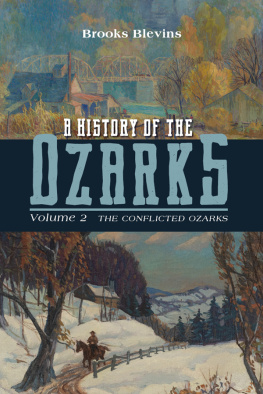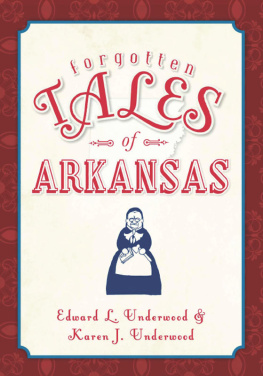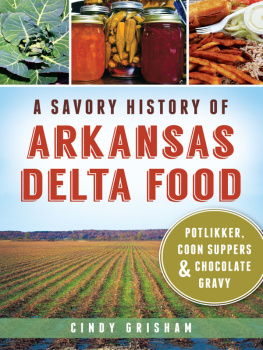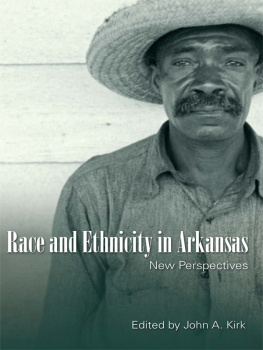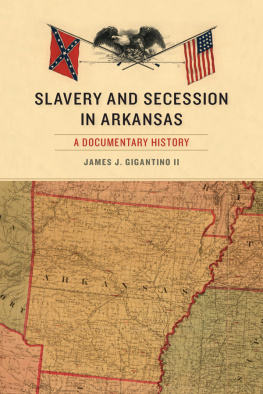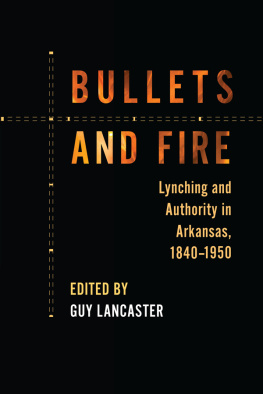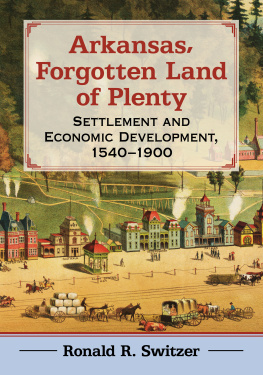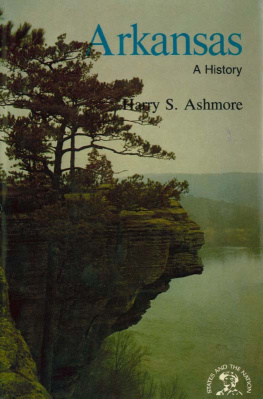Copyright 2009 by The University of Arkansas Press
All rights reserved
Printed in Canada
ISBN-10: 1-55728-905-0
ISBN-13: 978-1-55728-905-6
13 12 11 10 09 1 2 3 4 5
Text design by Ellen Beeler
The paper used in this publication meets the minimum requirements of the American National Standard for Permanence of Paper for Printed Library Materials Z39.48-1984.
Library of Congress Cataloging-in-Publication Data
Blevins, Brooks, 1969-
Arkansas/Arkansaw: how bear hunters, hillbillies, and good ol boys
defined a state / Brooks Blevins.
p. cm.
Includes bibliographical references and index.
ISBN 978-1-55728-905-6 (cloth : alk. paper)
1. ArkansasHistory. 2. ArkansasPublic opinion. 3. Arkansas
Social life and customs. 4. Bear huntingArkansasHistory.
5. Mountain peopleArkansasHistory. 6. RednecksArkansas History. 7. ArkansasBiography. I. Title.
F411.B695 2009
976.7dc22
2009018510
Publication of this book was supported by the Old State House Museum in Little Rock, Arkansas, whose exhibit on Arkansas, Arkansaw was curated by the author.
This is not a book about the state of Arkansas so much as it is about the idea of Arkansas. That is not to say that it is in some sense not Arkansas history. As most any native or resident of Arkansas knows, our states image has long been critical to its history and development. The stereotypes and image problems of Arkansas have for many years occupied the attention of a variety of people in the state, from business-minded boosters to historians. This is the first book-length telling of an integral part of the Arkansas storythe creation and evolution of Arkansaw. I am first and foremost indebted to the work of many scholars and writers without whom this book would have been impossible, among them James R. Masterson, C. Fred Williams, Michael B. Dougan, Morris Arnold, Foy Lisenby, Lee A. Dew, E. E. Dale, William Shea, Ben Johnson, and Bob Lancaster.
This is also a book written for Arkansas people, Arkansawyers and Arkansans, natives and newcomers. Not that Im asking you to shut it up and put it away if you dont claim to be either. Group image construction and identity can be a slippery subject. Confronting stereotypes and images can be painful; it can also be instructive and empowering. This particular piece of geopolitical angst, and the exhibit it will for a time accompany, grew out of an idea Larry Ahart had for an Old State House Museum exhibit on Arkansass hillbilly image. As these things so often do, the breadth and depth of the research involved expanded far beyond anything that Larry and I first discussed in the spring of 2002. To Bill Gatewood, Larry Ahart, Jo Ellen Mack, Gail Moore, Amy Peck, and the rest of the staff at the Old State House I offer my thanks. Many thanks as well to Debbie Self and to Larry Malley, Julie Watkins, Katy Henrikson, and the rest of the staff at the University of Arkansas Press for their fine work.
I have received assistance and advice from a great many of you Arkansawyers and Arkansans. I wrote this book while on the faculty of Lyon College in Batesville, Arkansas, and I extend my appreciation to many people currently and formerly affiliated with that institution. Kathy Whittenton, Lyon Colleges interlibrary loan librarian, was my link to the world of research libraries, as were her summer replacements Marjorie Seasholtz and Deanna Devall. I also appreciate the various kinds of assistance offered by library director Dean Covington and his other staff members, Camille Beary, Judy Blackwell, and Brenda Lindsey. I received valuable assistance from a trio of work-study students at Lyon, Kim Halpain, Melissa Harrison, and John Dudley. I also thank former students Julie Sandy and Blake Perkins and former Lyon colleague John Weinzierl for their contributions.
Realizing that I will unintentionally leave someone unmentioned who should be mentioned, I acknowledge the following for their assistance: Jimmy Bryant and the staff at the University of Central Arkansas Archives; Wendy Richter, Russell Baker, Lynn Ewbank, Jane Hooker, Jane Wilkerson, and the rest of the staff at the Arkansas History Commission; Tom Dillard, Andrea Cantrell, Geoffery Stark, and the staff at the University of Arkansas Special Collections in Fayetteville; David Stricklin, Brian Robertson, and the staff at the Butler Center for Arkansas Studies; the staff of the Archives and Special Collections at the University of Arkansas at Little Rock; Mike Polston and Mike Keckhaver of the Encyclopedia of Arkansas; Tim Hollis of the National Lum and Abner Society; Maxine Whittaker of the History Museum of Springfield-Greene County; and Tricia Hearn, formerly of the now-defunct Ozark Cultural Resource Center at the Ozark Folk Center. Robert Cochrans critique of the manuscript was excellent and invaluable, as was Lynn Morrows. Among the many who have offered valuable advice and information during the research and writing of this book are George Lankford, Susan Young, Jo Blatti, John Hensley, James Johnston, Michael Luster, Anthony Harkins, Stephen A. Smith, Tommy Hancock, Craig Ogilvie, Elizabeth Jacoway, Jeffrey Johnson, Laura Bowles, Marcia Camp, and the late W. K. McNeil. I am grateful for the many stimulating discussions I participated in during the Appalachia Up Close NEH institute at Ferrum College in the summer of 2004, and I thank Pete Crow, Dan Woods, Susan Mead, and my fellow participants. I take full credit for any valuable insights gained from conversations and correspondence with any of the people named above and stand ready to blame them for any shortcomings.
Arkansas/Arkansaw
Theres an old joke that most any Arkansas native has heard and that many have told in a variety of forms. One version goes something like this:
An Arkansas family was on the way to California in the heart of the depression when their truck (and here we all envision something akin to the Joads jalopy or the Clampettmobile) began to overheat. Pulling up to a filling station, the Arkansas father went inside to borrow a bucket of water. The attendant, by now no stranger to such beleaguered travelers, wryly asked, Where you from, mister? to which the Arkansawyer replied, Arkansas. Now laugh, damn you!
Other permutations find the defensive Arkie in modern-day Manhattan or on a nineteenth-century wagon trek or in a wartime boot camp, but the reaction, and the message, is always the same. Every Arkansas hearer or teller of the joke can empathize.
My grandpa certainly could have. Like many Arkies in the post-World War II era, my grandparents found financial salvation (at least of the temporary variety) on the migrant labor trails that snaked their way out of the Land of Opportunity in almost every direction. They often encountered voices of derision and looks of condescension for their trouble. Years later my aunt recalled an episode from one of the familys seasonal journeys, a trifle of a scene that flashed through my mind from time to time as I wrote this book. The setting was Yakima, Washington, in the latter half of the 1940s. After a grueling week of work in the hops vineyards that rose green toward the heavens in the Yakima River Valley, my grandparents dressed the kids up and took them into the city for the rare treat of popcorn and a coke. The teenager running the popcorn machine at the five and dime had seen enough of her little world to know a bunch of itinerant workers when she saw them, clean duds or no, and my grandpas request for two pokes o corn sealed the deal. Let me guess, the girl said, her tinny voice fortified with sarcasm and exasperation. Youre from Arkansas. Only it wasnt really a guess, more of an accusation, as if these paying customers were guilty of a crime and should feel ashamed for trying to hide it. My grandpa, by now no stranger to Arkie bashing but nevertheless caught off guard by the girls brazenness, fired back without hesitation. Why, no, were from Texas!


